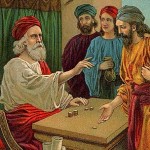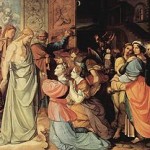Luke 2:8-20 The greatest present ever unwrapped
Â
I have some ribbon here. Who had a Christmas present wrapped in ribbon? The ribbon wraps up and protects the surprise hidden within. When we see a ribbon wrapping a box, we know that the box is something special. Its actually more than a box, its a gift; something special that we are going to receive for free from someone who loves us. The ribbon, all beautifully coloured, excites our imagination and heightens our sense of expectancy: What is under the wrapping? Will it be something I really want or need? Will this present change my life?Â
Â
Once the ribbon is undone, the present unwrapped, we begin to see and appreciate the gift. Once the ribbon is removed, the gift can then be used. Today is Christmas Day and today is the day many people all around the world unwrap the ribbons from around their presents to see and begin to use their new gifts.Â
Â
Today is the day we as Christians are reminded of God’s gift to us; a gift also wrapped in ribbon as the angels proclaimed ‘”Do not be afraid. I bring you good news of great joy that will be for all the people. Today in the town of David a Saviour has been born to you; he is Christ the Lord. This will be a sign to you: You will find a baby wrapped in cloths and lying in a manger.“ God’s gift to us was wrapped in ribbon cloths and lying in a manger.
Â
The ribbon cloths wrapped around the baby Jesus, in a hidden way, presented him to us as a present from God; a present to be unwrapped, a free gift of love from God to us. The ribbon cloths, in God’s own special way, made Jesus more than just a baby, more than just a man. They were a sign to us that this baby is Jesus the Christ; the chosen one from God, as the angel said ‘he is Christ the Lord and this will be a sign to you: You will find a baby wrapped in cloths’.Â
Â
Like all presents, in order to be seen and enjoyed, Jesus couldn’t stay wrapped in the safety of his cloths, he needed to be freed to grow, live and work in the world. Jesus needed to reveal himself to us as God’s Son and to show us what it meant for him to be the Christ…the one who would save people from their sins. And he did just that, as Luke reports ‘Jesus grew in wisdom and stature, and in favour with God and men.’ From the moment the ribbons of cloth were removed, the gift of Jesus was unleashed onto the world and the world was never the same.
Â
And it was during these years of Jesus ministry that he showed us just how much of a special gift he was to us. During his time among the people of Israel, he demonstrated God’s love through his actions and words.Â
Â
Jesus was a present to the blind by giving them sight. He was a present to the crippled by enabling them to walk.   He was a present to the lost and outcast by giving them hope. He was a present to the grieving by weeping with them, a present to the joyful by bringing the dead to life. And he was a present to those who were hated by saying ‘If any one of you is without sin, let him be the first to throw a stone.”
Â
Yet this was not the ultimate purpose of Jesus ministry. These gifts were only part of the bigger present of Jesus. God sent his only Son to be a gift for all of humanity, for you and me as well, as the angel’s announced ‘Glory to God in the highest, and on earth peace to all people on whom his favour rests.’ In order to bring true peace to all people, the ribbon cloths wrapping Jesus as a baby needed to wrap his body one more time. For God’s present to us to be total and complete, the ribbon cloths were used a second and final time.Â
Â
Just as Jesus’ tiny body as a baby was wrapped in ribbon cloths and placed in a manger, Luke records what happened to Jesus crucified body; bruised, beaten and bloodied for our salvation ‘They took Jesus body down [from the cross], wrapped it in linen cloth and placed it in a tomb cut in the rock.’ And there he lay. God’s present to us, the gift of Jesus; still and lifeless, wrapped in ribbon cloth. That is, until God himself unwraps Jesus, throws the ribbons of cloth away, and raises him to life. Our best ever present has now been completely unwrapped and the Christmas angel’s announcement to us has now been fulfilled.Â
Â
‘Do not be afraid. I bring you good news of great joy that will be for all the people. Today in the town of David a Saviour has been born to you; he is Christ the Lord.’ Through Jesus birth, life, death and resurrection, he has given to all who believe the gift of eternal life. This is what makes Jesus is the best present ever, and this is what makes him our saviour, and this is why he IS Christ the Lord.
Â
Amen  Â
Â
Â
Â



